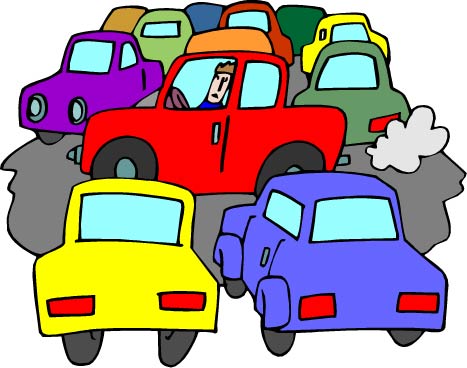Do You Suffer from Driving Anxiety?
Driving anxiety is the most common form of anxiety that I treat in my hypnotherapy practice. This can range in severity from a hesitation to drive, where anxiety is always present, all the way up to a total refusal to drive at all, in which case it becomes driving phobia. A phobia is a fear that is paralyzing but irrational. Driving phobia is one of the most common phobias.
Driving phobia is a form of agoraphobia, literally defined as is the fear of open spaces. But it’s not the fear of open spaces that scares people, it fear of loss of control. People with a driving phobia or driving anxiety fear being trapped in a traffic jam and unable to escape if they have a panic attack. They also fear passing out, losing control of the vehicle, throwing up or getting into an accident. For many people, driving next to big trucks, merging onto the freeway or driving in the fast lane can be very nerve racking.
Symptoms of driving anxiety
Symptoms of driving anxiety are similar to most other forms of anxiety: heart palpitations, perspiring and sweaty palms, disorientation, confusion, dizziness, dry mouth and shortness of breath. This is the classic “fight or flight response”. Some times people feel that they are going to die or go crazy. This can be really scary and people will simply not drive to avoid these kind of intense feelings. It’s good to remember that these are just feelings and even the most severe panic attacks don’t cause any long term ill effects.
Still, driving anxiety can seriously impact a person’s ability to function on a daily basis if they need to drive to work or drive for a living, especially here in So Cal where driving is necessary to get anywhere fast.
How does driving anxiety start?
Driving anxiety can start in many ways. Usually a person has experienced a car accident or “close call” and that memory is still causing the subconscious mind to be protective. Sometimes, this kind of anxiety can show up out of the blue. If you are a person that is prone to anxiety or fear, then driving may be one place where this shows up.
In addition,having episodes of low blood sugar can create anxiety. If this happens while driving, then you might start associating driving with anxiety. Low blood sugar can be caused from not eating or after eating a meal high in simple carbs or sugar. This is especially true for those that have family histories of diabetes or hypoglycemia.
Driving anxiety can turn into a phobia though avoidance. In other words, of you have some fear of driving and you decide to stop altogether, it becomes a full blown phobia and the more you avoid it, the harder it is to get back in the saddle, so to speak.
The good news is, fear of driving is a learned behavior. If you have ever felt comfortable driving, then that is something you learned. If you are uncomfortable now, you can relearn how to be comfortable again. Here are some tips to help you get back on the road feeling safe and comfortable and confident. If you are currently not driving due to driving anxiety, I highly suggest you get help by contacting me or another professional so I can help you.
Tips to help with driving anxiety.
- The basics: avoid blood sugar imbalances. Avoid driving on an empty stomach.Pay attention to how you feel after eating certain foods, especially those high in sugar or simple carbs (bread, pastries, soft drinks). Drinking alcohol the night before can also trigger blood sugar imbalances. Also, if you are driving while sleep deprived, you are asking for trouble. Start by taking care of yourself.
- Caffeine: is a known trigger for anxiety. Some of my clients have felt relief from driving anxiety just by cutting back on caffeinated beverages.
- Consider car pooling. If you are engaged in conversation you are less liable to think anxious thoughts. You also have to drive half as much. Think this one over carefully, as some people are more distracted while conversing while driving.
- Manage your stress. A common cause for anxiety is extended periods of overwhelming stress. Do what you can to lower your stress level: exercise, take more breaks, meditation, yoga, etc.
- Affirmations.Hand write, in script, some positive affirmation about your ability to drive calm, comfortable and relaxed. For example “I’m calm, comfortable and relaxed while driving and enjoying listening to music (the radio, audio books, etc.)” Read them right before you go to bed and right after you wake up. Say them out loud and imagine yourself driving while feeling calm and relaxed. Don’t underestimate the power of this simple exercise.
- What really stops most people is the anticipatory anxiety:“Oh my God, I need to drive tomorrow out to the west side. I just know this is going to cause me a lot of anxiety. I’m already feeling it!” Instead, try saying something like”If I feel anxious I know I can handle it.”
- Desensitization. This is a therapeutic technique that can help you become more comfortable with what is fearful. It involves taking small steps to get comfortable with situations that trigger anxiety. For example, if you can’t even drive your car, then start by sitting in your car in the driveway or on the street with the engine on but not moving. Notice whatever anxiety comes up and just be with it. Do that for longer periods of time until you can sit in the car, engine running, without anxiety. When you reach that point, and it may take a few hours or a few days, then drive around the block. If you feel anxiety, just pull over until it goes away, then continue driving. For freeway driving, you might try getting on one on ramp, staying in the slow lane, and then getting of on the next off ramp.
The most important thing to realize is that even though driving anxiety does not feel good, it will not kill you. It is your reaction to the feeling of anxiety that determines how you manage it. Instead of fighting anxiety, just allow it to be. Notice it, and see if you can observe it with detachment. Take deep breaths and try to remain in the present moment. Realize you have a tendency to create anxiety with your thoughts so try focusing on something else, like the environment, music, or the cars in front of you.
If you are still driving even though you experience anxiety, these tips can be helpful and good luck. However, if your level of anxiety is very high, you will probably need some help. You don’t need to live with the anxiety; give me a call.
Ted A. Moreno
Click Here For a Free Guide to Relieve Anxiety












Thanks Ted. These are good tips and will help me as sometimes I do feel anxious when I get on the freeway.
I’m glad your post used the “stress” link in the fourth bullet. I re-read that post from last year, but I really needed it today more than ever.
Thanks Ted! I know my driving anxiety is when I’m not the one driving. I hate not being in control & am a notorious back seat driver – just ask my wife!
I had very crippling driving anxiety so bad that people were considered brave for letting me drive… But w/help from Ted it has been reduced to brief worries and the gift of a GPS has freed me greatly. But remember the sessions are a joint effort no magic wands (damm) But worth the investment going places now is an adventure with me in leading the way…. Have an address will travel (new saying I use) Last Tip visualize your goal successful reached before you turn the key… rhb
Thanks for the testimonial Rebecca!
Hello Ted!
I had an accident once because of my generalized anxiety. After the accident, I consulted a doctor about my disorder and gave me some treatments. One of the tips he gave was to spend time for my self and do exercises. Great tips you gave! I assume you are a doctor.
Thanks for the comment Bruno, no, I’m not a doctor. But if I wanted to , I could play one on TV…
great post! i am just starting out in community management marketing media and trying to learn how to do it well – resources like this article are incredibly helpfulhttp://www.apartamentosecasas.org
Your own write-up has confirmed necessary to me. Ӏt’s really educatiοnal and уou’re clearly extremely knowledgeable in this region. You have got popped our face in order to varying opinion of this particular subject matter with intriquing, notable and solid content.
my blog post Angelo